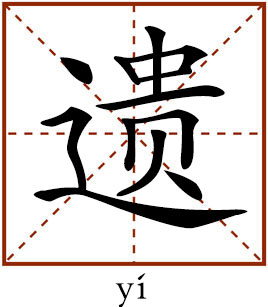Lost

When used as a verb, this character often means “lost” or “handed down or left behind at one’s death.”
路不拾遗
lù bù shí yí
Lu refers to roads or streets. Bu means “not” and shi “pick.” Yi refers to lost property. This term, taken literally, means that no one picks up and pockets anything lost on the road.
This is an idiom originally derived from Hanfeizi, an ancient Chinese text attributed to the foundational political philosopher Han Fei (c. 280–233 BCE), depicting that honesty and high moral standards prevail throughout society, so that no one picks up anything that has been left on the road. According to historical texts, there are several historical figures associated with this idiom. The first one is Gongsun Qiao, better known by his courtesy name Zichan, a statesman of the State of Zheng during the Spring and Autumn Period (770–476 BCE). According to Hanfeizi, as the prime minister of Zheng, Zichan strengthened the state of Zheng through many reforms, a difficult task for a small state surrounded by several large states. He reformed the government to emphasize the rule by law. As a philosopher, Zichan separated the domains of heaven and the human world, arguing against superstition and believing that humans should be grounded in reality. Under Zichan, people in the state of Zheng had a high social consciousness, and “no one stole” or “picked up anything that had been left on the road.”
Another historical figure is Emperor Taizong (598–649) of the Tang Dynasty, who is typically considered to be one of the greatest emperors in China’s history. His era, the “Reign of Zhenguan,” is considered to be the heyday of the Tang Dynasty, as well as one of the most prosperous periods in ancient China, characterized by unprecedented economic and social prosperity. China at the time was so affluent and stable that this idiom claimed that “people could leave their doors open at night without fear of being burgled” and that “items left on the road remained untouched by others,” as recorded in the Zizhi Tongjian (Comprehensive Mirror for Aid in Government).
Edited by REN GUANHONG

 PRINT
PRINT CLOSE
CLOSE